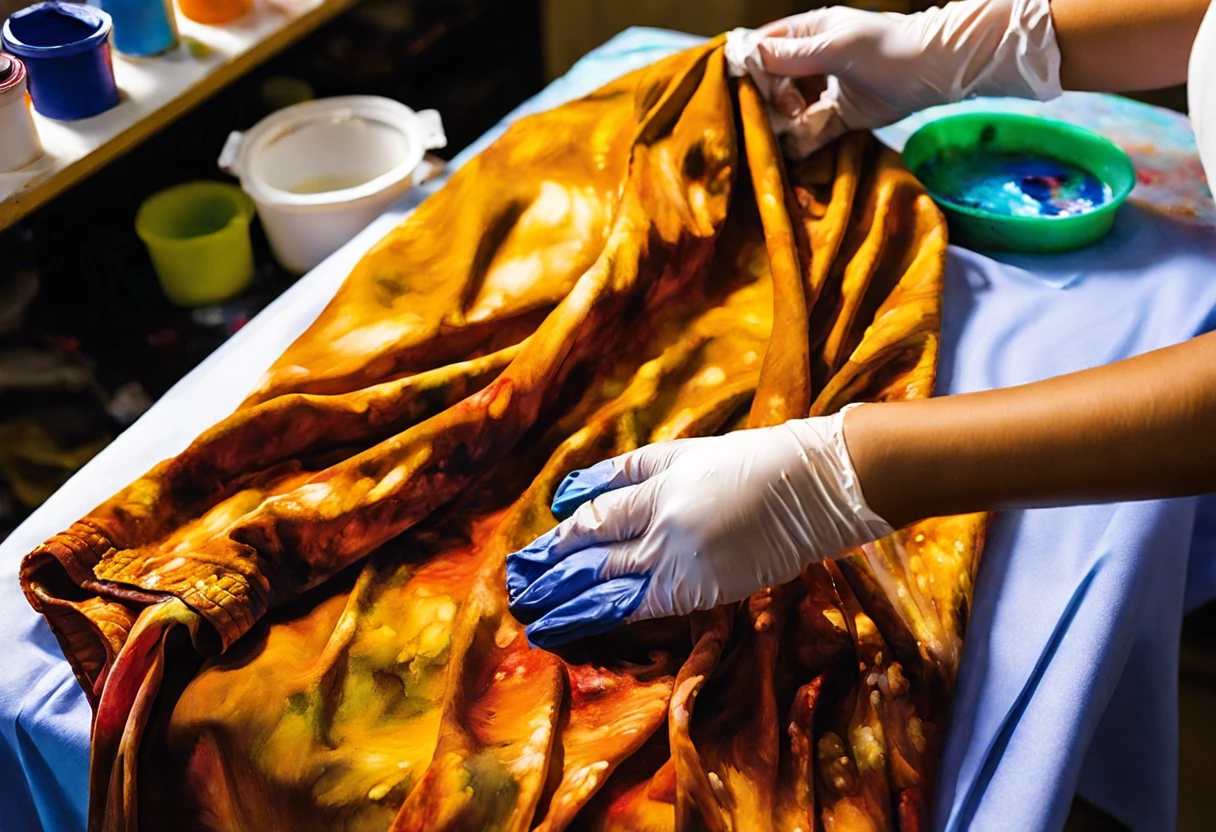How to Get Acrylic Paint Out Of Clothes?
Published on: March 27, 2025 | Last Updated: January 7, 2025
Written By: Alisha Winters
Acrylic paint’s a colorful, fast-drying paint made from tiny plastic particles. It magically sticks to things, creating vibrant artwork!
Now, learning how to get acrylic paint out of clothes is super important. Trust me, I’ve spilled paint on my favorite shirt before, and it was a nightmare trying to clean it!
In this guide, you’ll find essential preparations for removal, effective steps for cleaning, common issues, types of paint that stain, and even DIY project ideas. Get ready to tackle how to get acrylic paint out of clothes with confidence!
Contents
- 1 How to Get Acrylic Paint Out Of Clothes?
- 2 What is Acrylic Paint?
- 3 Before You Start: Essential Preparations for Removing Paint
- 4 Steps to Effectively Remove Acrylic Paint From Clothes
- 5 How to Treat Different Acrylic Paint Effects
- 6 Time-Saving Tips for Quick Stain Removal
- 7 Types Of Acrylic Paint Most Likely to Stain Clothes
- 8 Factors Affecting Acrylic Paint Removal From Fabric
- 9 Common Issues When Trying to Remove Acrylic Paint From Clothes
- 10 Stain Treatment Techniques for Different Fabrics
- 11 Tools You Can Use to Help Remove Acrylic Paint
- 12 Finishing Touches: Ensuring Complete Stain Removal
- 13 Frequently Asked Questions About How to Get Acrylic Paint Out Of Clothes
- 14 Conclusion: Successfully Removing Acrylic Paint From Your Clothes
- 15 Useful Resources
How to Get Acrylic Paint Out Of Clothes?
To remove acrylic paint from clothes, act fast! Rinse the stain with cold water, then apply dish soap. Gently scrub the area, and rinse again. For stubborn stains, repeat or use rubbing alcohol. Discover how drills using AB diamonds can transform your crafting projects by providing a unique visual sparkle and shine in diamond painting.
The Finishing Touch
A freshly painted wall is a blank canvas. The best way to bring your room to life is with a single piece of statement art that ties everything together.
Browse Wall Art at Big Wall DecorWhat is Acrylic Paint?
Acrylic paint is a fast-drying, water-based paint made from pigments suspended in an acrylic polymer emulsion. It comes in two main types: heavy body and fluid, with viscosities ranging from 200,000 centipoise (Cp) for heavy body to 1,000-5,000 cP for fluid acrylics. If you’re considering painting on ABS plastic, knowing the proper painting techniques for different materials can ensure successful adhesion and finish.
In my experience, I’ve occasionally dealt with spills while painting. When those acrylic messes occurred, my wardrobe took quite a hit!
I find acrylic paint useful for work, especially when I need vibrant colors that dry quickly for layering. The downside? When I accidentally splattered some on my shirt, learning how to remove acrylic paint from clothes became essential. You wouldn’t believe how the right techniques can save your favorite tee! If you’re considering upgrading your space, you’ll be interested in exploring how to paint ceramic tile floors to match your creative vision.
Before You Start: Essential Preparations for Removing Paint
What do you need to get started?
- Liquid laundry detergent: Use a powerful liquid laundry detergent, like Tide Ultra Stain Release (1 L), to break down the acrylic paint’s oils and pigments.
- Rubbing alcohol: High-proof rubbing alcohol, such as 91% isopropyl (473 Ml), helps dissolve dried paint effectively.
- White vinegar: You’ll need distilled white vinegar (240 Ml) to neutralize harsh chemicals in the paint and help lift it from fibers.
- Soft brush: A soft-bristle brush, like an old toothbrush, is essential for gently scrubbing the area without damaging the fabric.
- Paper towels: Use absorbent paper towels to blot and remove soaked paint and cleaning solutions without smearing.
You should now have a good understanding of essential preparations for paint removal. In the next part, we’ll discuss effective steps for removing acrylic paint from clothes.
Also See: Can You Paint Treated Lumber? Easy Tips

The Finishing Touch
A freshly painted wall is a blank canvas. The best way to bring your room to life is with a single piece of statement art that ties everything together.
Browse Wall Art at Big Wall DecorSteps to Effectively Remove Acrylic Paint From Clothes
Follow these steps to efficiently remove acrylic paint from clothes for the best results.
-
Identify the Type Of Fabric
Check what your clothes are made of. Cotton and polyester handle different treatments better, so knowing the fabric is important.
Use a cold-water test on a small corner for delicate fabrics like silk. If it survives, you’re in the clear.
-
Act Quickly: Time is Of the Essence
The first few seconds can make a big difference. Take action within 30 minutes for the best chance of removal.
Remember, drying sets the paint. If you wait too long, it’ll be harder to remove.
-
Rinse the Stain With Water
Run cold water over the back of the stain. This pressure pushes the paint out. Avoid hot water; it’ll set the stain!
Rinsing with a gentle stream makes a significant difference compared to soaking. You don’t want to spread the paint!
-
Apply a Stain Remover
Use a stain remover designed for acrylic paint. Apply it generously to the affected area and let it sit for about 10 minutes.
If you don’t have a remover, dish soap and warm water can help. Apply it, then scrub gently with a soft brush.
-
Wash the Garment Normally
After treating the stain, toss it in the washing machine with cold water on the normal cycle. Never put it in the dryer unless you’re sure the stain is gone; heat can set it!
For best results, add a cup of white vinegar with the laundry detergent. This trick helps break down any leftover residue.
We’ve wrapped up the steps for effectively removing acrylic paint from clothes here. Let us turn our attention to treating different acrylic paint effects.
How to Treat Different Acrylic Paint Effects
Acrylic paints can create different effects, leading to various challenges in removal. Here’s how to manage those effects.
| Effect Type | How to Treat | Effectiveness Rating (1-5) |
|---|---|---|
| Thick Textures (like Heavy Body Acrylics) | Gently scrape excess paint with a plastic knife, then treat with a liquid detergent. | 4 |
| Poured/Fluid Acrylics | Apply a stain remover immediately, then rinse with cold water. | 5 |
| Layered Paint (e.g. through techniques like pouring) | Use a mix of vinegar and baking soda paste. Gently scrub after a 15-min wait. | 3 |
| Metallic or Neon Acrylics | Use rubbing alcohol or dedicated paint remover for effective lifting. | 5 |
So far we covered methods for treating various acrylic paint effects. Let’s look at time-saving tips for quick stain removal next.
Time-Saving Tips for Quick Stain Removal
Got a busy schedule? Here are some quick tips to get those stains out in no time!
- Pre-Soak in Warm Water: If paint’s still wet, soak the fabric in warm water for 10 minutes to make cleaning easier.
- Use Quick Stain Removers: Have a stain removal pen on hand? It’s perfect for those “oops” moments.
- Target the Stain: Dab a small amount of rubbing alcohol directly on the stain before washing.
- Keep Spare Clothes Nearby: Always have an old shirt or covering to protect against accidents while painting!
We have now covered effective strategies for quick stain removal. The next section will discuss the types of acrylic paint that commonly stain clothes.

Types Of Acrylic Paint Most Likely to Stain Clothes
Let’s discuss the types of acrylic paint: Heavy Body Acrylics, Soft Body Acrylics, Pouring Acrylics, and Interactive Acrylics.
-
Heavy Body Acrylics
These acrylics have a thick texture, making them great for palette knife work. However, their density makes them stubborn to remove from clothes.
-
Soft Body Acrylics
Soft Body Acrylics are runny and smooth, perfect for fluid artwork. However, their liquid nature allows them to seep into fabric fibers, creating tough stains.
-
Pouring Acrylics
These are formulated for pouring techniques. Beware; pouring acrylics can create neon pigments that cling to clothes if spilled.
-
Interactive Acrylics
Designed to blend with water, Interactive Acrylics react differently than standard acrylics, complicating fabric removal. The added water makes them harder to wipe off before drying.
From experience, I can say that Interactive Acrylics are challenging on fabric; I once scrubbed for hours to remove a speck from my favorite shirt. Always tread carefully!
Factors Affecting Acrylic Paint Removal From Fabric
What factors influence cleaning acrylic paint from clothes?
-
Fabric type: Some fabrics, like cotton, absorb paint quickly, making stains tougher to remove.
-
Paint thickness: Thick layers of acrylic paint adhere strongly, requiring more effort and time to remove.
-
Time before treatment: Allowing paint to set longer can lead to permanent stains; act fast!
-
Temperature of water: Hot water can set the stain, while cold water can help lift it gently.
Common Issues When Trying to Remove Acrylic Paint From Clothes
A friend once freaked out when she accidentally mixed her blue paint with the rest of the laundry, staining her white shirt. Use 50% isopropyl alcohol and a cotton ball to treat 1:1 paint spots directly. Dab gently, then rinse with cold water—never hot! When choosing a color for your bathroom vanity, consider the mood you want to create, as this can greatly affect your bathroom’s ambiance. Find inspiration for what color to paint bathroom vanity.
You might want to try sodium bicarbonate (Baking Soda). Mix two tablespoons with water to create a paste, apply it, and scrub gently! That’s real power in tackling stubborn acrylic stains.
The Finishing Touch
A freshly painted wall is a blank canvas. The best way to bring your room to life is with a single piece of statement art that ties everything together.
Browse Wall Art at Big Wall Decor
Stain Treatment Techniques for Different Fabrics
Different fabrics require different treatments for optimal stain removal.
| Fabric Type | Treatment Method | Effectiveness Rating (1-5) |
|---|---|---|
| Cotton | Use dish soap and cold water. Soak for 30 minutes. | 5 |
| Polyester | Apply rubbing alcohol, then wash with liquid detergent. | 4 |
| Silk | Blot gently with vinegar solution; avoid scrubbing. | 3 |
| Denim | Use a paste of baking soda and water; scrub lightly. | 4 |
| Wool | Use cold water and mild soap; do not scrub. | 2 |
Tools You Can Use to Help Remove Acrylic Paint
Check out some handy tools for acrylic paint removal.
- Paintbrush or Toothbrush: Scrubbing gently can lift paint without damaging fabric.
- Air Compressor: Blowing air can help remove dried paint from grooves in fabric.
- Steam Iron: Using steam lightly can help loosen paint for quick removal.
- Stain Removal Pen: Handy for quick fixes on small stains when you’re on the go.
Finishing Touches: Ensuring Complete Stain Removal
After treating acrylic paint stains, launder the fabric in hot water—about 60°C (140°F) for cotton. Always check the label for temperature guidelines.
Inspect areas under UV light to spot residual pigment. Pay close attention to seams and folds, and use products like Clorox bleach for stubborn remnants; I found it effective on my jeans.
Here’s a pro tip from my experience: For layered stains, apply acetone-based nail polish remover to an absorbent cloth to lift acrylic quickly, using short dabs to control the spread.
Frequently Asked Questions About How to Get Acrylic Paint Out Of Clothes
What if the Acrylic Paint Has Dried on the Fabric?
If the acrylic paint has dried on the fabric painting surface, it becomes more challenging to remove. Dried paint can bond with fibers, making it stubborn to treat. Techniques like using isopropyl alcohol (70% or Above) can help dissolve the paint effectively.
Can I Use Bleach to Remove Acrylic Paint Stains?
No, you shouldn’t use bleach to remove acrylic paint stains. Bleach can react poorly with pigments in the paint, possibly setting the stain. Instead, opt for specialized stain removers or soapy water to avoid damaging the fabric. If you are working with 3D models and need information on supported formats, check the 3D file formats Substance Painter supports.
Are There Specific Products Recommended for Paint Removal?
Yes, some products are highly recommended for paint removal, including commercial paint removers and solvents like Goo Gone. These products target paint and eliminate it without harming the fabric. Always follow the instructions for best results. If you’re considering altering surfaces beyond paint removal, you might be wondering whether you can paint backsplash kitchen tile; this information could guide your related home projects.
How Can I Prevent Acrylic Paint Stains While Painting?
To prevent acrylic paint stains while painting, wear old clothes and cover surfaces. Use drop cloths for your work area and aprons for added protection. These steps can save your favorite clothes and keep messes contained year-round. If you’re considering personalizing your little one’s style, you might wonder about the safety and methods of painting your child’s nails.
Will Soaking in Vinegar Help With Paint Removal?
Yes, soaking in vinegar can help with paint removal. Vinegar’s acetic acid works to break down the paint, making it easier to scrub out. Try soaking the fabric for 30 minutes before applying gentle scrubbing techniques. If you’re curious about altering the appearance of your home’s interior, you might wonder about painting backsplash tile.
Conclusion: Successfully Removing Acrylic Paint From Your Clothes
We’ve reached the end, and I appreciate you sticking around. We covered essential preparations, types of acrylic paint, effective removal steps, common issues, factors affecting removal, finishing touches, and DIY project ideas.
To recap how to get acrylic paint out of clothes, remember to act quickly, use the right tools like soap and water (or rubbing alcohol), and always test fabrics first. Don’t hesitate to get in touch for further assistance with any stubborn stains.
For more insights and tips on handling paint-related challenges, visit our homepage at Paint Answers.
Useful Resources
- Smith, R. (2003). The Artist’s Handbook of Materials and Techniques (5th ed.). New York, NY: Knopf.
- r/Adulting on Reddit: Hi adults of reddit! My sister got acrylic paint all over my favourite sweaters and let it dry before telling me- any ideas on how to get it out or is it unsalvageable?
- How to Remove Acrylic Paint from Clothes – The Sketching Pad
Experienced interior designer with 15+ years in transforming spaces, blending artistry with expertise in color and design. Rhode Island School of Design graduate, specializing in restorations and modern makeovers.
Fabric, Material









